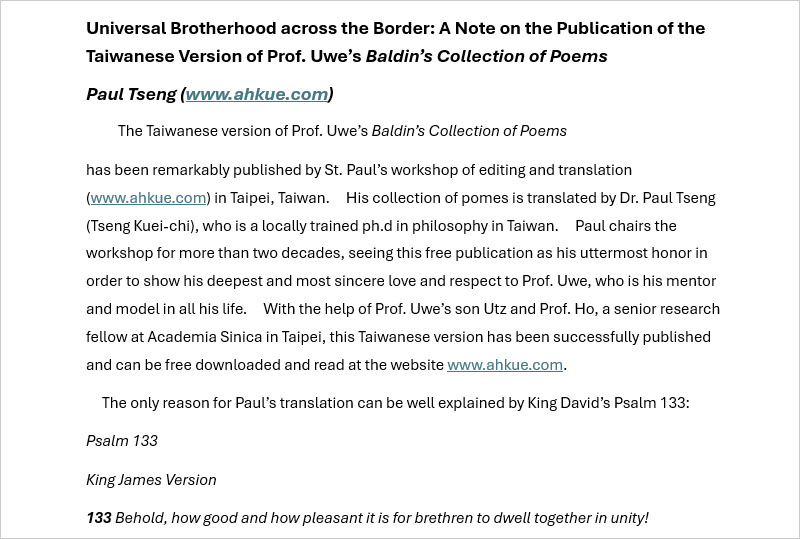STUDY 研究與創作
研究著作 Hermeneutic Philosophy and Reading
2023-06-06 / 文:Paul Tseng

Preface
The bririef ef overview of Paul Tsengs "Hermeneutic Philosophy and Reading" is as follows:
In chapter 1 "Hermeneutics: An Introduction into the Origin, the Hermeneutical Circle, the Application, and Metacriticism, "This study is an introductory study of four aspects of hermeneutics: its origin, the hermeneutical circle, the application and metacriticism."
In chapter 2 "Heideggers Hermeneutic Philosophy in Being and Time,"
"Heideggers hermeneutic philosophy is based on Being and Time. His hermeneutics is derived from his mentor Edmund Husserl, who developed a method of analysis called "phenomenological reduction" or "bracketing." This kind of phenomenology that Heidegger developed in Being and Time is sometimes called hermeneutic phenomenology."
In chapter 3 "Gadamers Hermeneutic Philosophy," "The central argument of hermeneutic philosophy can best be illustrated by reference to the title of Gadamers book, Truth and Method, in which among some prominent points he highlights historicality, fusion of horizons, and linguisticality of understanding."
In chapter 4 "Nietzsche and Jameson on Temporality: On the Axis of the Word/Logos," "This paper is designed to make a synchronic and diachronic comparison between Nietzsches view oftemporality and that of Fredric Jamesons.
In chapter 5 "A Religious Significance of Book Fourteenth of The Prelude: A Hermeneutic Approach," Book Fourteenth of The Prelude serves as a religious conclusion which signifies that a spiritual communion with God, infinite and transcendental and magnificently expressed by Nature, can heal and restoremans mind in his crises of life. This article aims to employ hermeneutics to explicate religious significances of Book Fourteenth.
In chapter 6 "Paradise Lost: Fore-Structure, Structure, (And De-Structure),"
"This paper is designed to simultaneously apply the concepts of fore-structure, structure, and de-structure to uncover the hidden meaning of Miltons Paradise Lost."
In chapter 7 "A Theological Reflection of "Being" in the Book of Ecclesiastes," "In this paper, I apply Heideggers concept of Being to conduct a theological reflection of "Being" in the book of Ecclesiastes."
In chapter 8 "An Introductory Exploration of Pauline Epistles," "In Christian theology, Pauline epistles play a vital role in the doctrine of the New Testament. His epistles are composed in a certain linguistic pattern and embraces central theological thoughts. This paper is designed to analyze his rhetorical theory and central thoughts by conducting an introductory exploration of his language and theology."
In chapter 9 "A Hermeneutical Understanding of the Historical Significance of Psalms," "I apply Gadamers view of historicity to undergo a hermeneutical understanding of the historical significance of Psalms, which narrates Israelites history including creation, the patriarchs, Egyptian bondage, Sinai, the wilderness, conquest, life in the land, and the exile and return."
In chapter 10 "A Hermeneutical Reading of William Wordsworths Lyrics,"
In chapter 11 "Book Reviews for Cambridge Scholar Publishing: A Hermeneutic Approach," "In recent years, I have been honorably invited three times by Prof. Heinz-Uwe Haus, an international recognized drama professor and theater director, to write book reviews for his three books, which were prestigiously published by Cambridge Scholar Publishing Company based in London, the UK.
I consistently use a hermeneutic approach to comment and recommend his books, particularly employing the relevant passages in the Scripture to analyze, highlight the essential spirit of his books in order to create a fusion of horizons and to demonstrate the authors meaning from the angle of a critic."
In chapter 12 "A Hermeneutical Reading of My Diary in the Summer of 2015," "My diary in the summer time of 2015 is a record of my experience oflogos. And my living experience of the Word considerably revealed a few hermeneutically universal principles in life."
In chapter 13 "Hermeneutic Structurism: A Taiwanese Literary Voice," "Prof. Chen Man-ming is a recognized Chinese literary theorist, and his structurism in Chinese composition turns out to be a literary school in Taiwan. I am the main translator of his masterpiece entitled "Discourse Analysis in Chinese Composition." The third chapter, which I am responsible for, is the core chapter in this book. In this long paper, I summarize the main ideas of this chapter to present how the Taiwanese structurism is related to the Western hermeneutics in terms of Heideggers fore-strucuture/presupposition and E.D. Hirschs authors meaning."
The brief introduction is quoted from his multiple abstracts to manifest his true intentions. These thirteen chapters are divided into three parts: part 1 hermeneutic philosophy, part 2 hermeneutic reading, and part 3 hermeneutic structurism.
According to my observation, part one is the theoretical foundation of hermeneutics. Part two is Paul Tsengs application of hermeneutics to his academic reading including literary works, theological texts, and philosophical books. And Part three is his extended introduction of comparative literature, which is based on hermeneutic struc?製m.
Paul Tseng has long been dedicated to the study of hermeneutics for over two decades. I strongly and sincerely recommend his innovative work.
Hof-ping
Former chair at the department of applied English at both Taipei University of Technology and Tung-nan University







